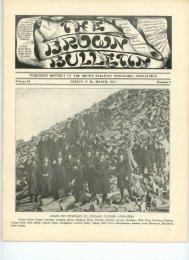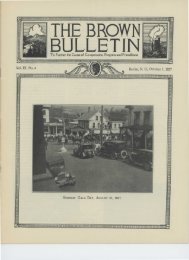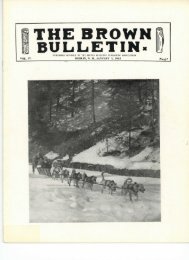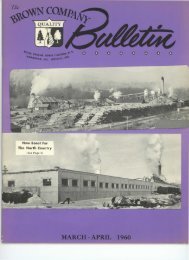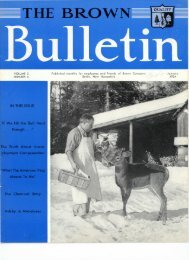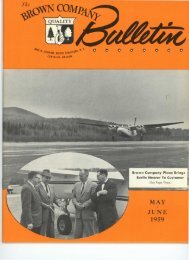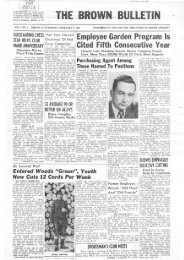THE BROWN - Berlin and Coös County Historical Society
THE BROWN - Berlin and Coös County Historical Society
THE BROWN - Berlin and Coös County Historical Society
You also want an ePaper? Increase the reach of your titles
YUMPU automatically turns print PDFs into web optimized ePapers that Google loves.
WELL LI L, LOOK*<br />
L»KE IT'f T/M£ TO CWAN6E<br />
TRUCK5-THIJ ONE HAS<br />
HELD UP WELL, HOWEVf/Q<br />
UETJ 60 SEE<br />
<strong>THE</strong> DEALER, BILL.'<br />
WE'VE 60TALL<br />
TWE DEPBK/ATfON<br />
MONEY ON HAND'<br />
.. HOWEVP2 WE- CAN ALLOW YOU<br />
$IOOO. ON YOUR OLD TRUCK, $O<br />
IT WILL TAND XOU ONLY $8OO.<br />
FOR THIS /Q53 MODEL'<br />
-THf OLD TRUCK<br />
GAVE 6OOO SERVICE<br />
$o i GUESS WE'LL<br />
CHANGE/<br />
provided is only half enough to replace the old machine. All<br />
these years we should have been saving $2,000 a year in-<br />
stead of $1,000.<br />
You might ask why we didn't look ahead <strong>and</strong> see that<br />
with prices going up all the time, we'd need to have more<br />
depreciation set aside. Well, we would, but here's where the<br />
second catch comes in. Uncle Sam won't let us. The Federal<br />
government tells us how much we can put into depreciation,<br />
<strong>and</strong> won't let us put in any more.<br />
Why? Well, the amount we provide for replacing old<br />
equipment has to come out of the money we take in from<br />
the sales of our products. If we put it in depreciation, it<br />
doesn't show up as profit. It really isn't profit, of course;<br />
it's a necessary expense.<br />
It's important both to shareholders <strong>and</strong> employees that<br />
there should be enough money on h<strong>and</strong> to keep the company's<br />
equipment in the best shape possible. Important,<br />
because it means the security of the money they have invested,<br />
<strong>and</strong> of their jobs.<br />
But the more you put in depreciation, the smaller the<br />
figure that shows up on the books as profits. Taxes come out<br />
THOSE /YEW<br />
MODELS $UR£<br />
LOOK TOP5/<br />
YOU SEE, HONEY; WE WAVE TO<br />
/A/TO PROF/T* FOR $176.<br />
fcfCAUSE WE D/D'/VT Pt/T ENOU6W<br />
BILL THMf <strong>THE</strong>.<br />
TVPf T/J6/CK YOU SOUGHT<br />
2_Y£ARS AGO. OF COURSE<br />
OP X2/SI/V6 COSTS TW£<br />
PRICE THISYF/W? 15 $I8OO.....<br />
GOSH/ I WONDER IP<br />
A LA/?6E OC6ANI7ATIOA/<br />
LIKE <strong>BROWN</strong> COMPANX<br />
/A/ TOWN/, HAS<br />
<strong>THE</strong><br />
DEPRECIATION/?<br />
of profits. Anything that lowers profits, lowers taxes too.<br />
That's why Uncle Sam tells us how much we can put<br />
in depreciation. And although he lets some utilities set their<br />
rates on the amount it would cost to replace their equipment<br />
at today's prices, he only lets paper mills save up what their<br />
equipment cost in the first place. And it isn't enough.<br />
That's why, when Brown Company plunged into its<br />
high cost improvement <strong>and</strong> expansion program, it had to<br />
look elsewhere besides its depreciation account to find the<br />
money for it. It had to use a big part of the profit earned<br />
in these years to pay for the improvements.<br />
Yes,—a big part of the profit. But actually, by the best<br />
accounting methods, that should never have been called<br />
profit at all. It should have been put into depreciation in<br />
the first place.<br />
To keep a business sound, you've got to be able to keep<br />
your plant up-to-date, in first-class condition. You can't win<br />
in the 1952 market with 19C7 :i ills. TL-\'. ':• '• W • s necessary<br />
for Brown Company to imp: :fe it.' p-'- ' - > .'"-" where<br />
. !•„<br />
the money comes frc-ui.<br />
Lfi



